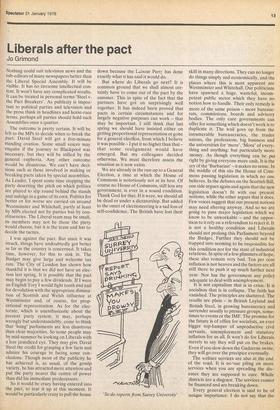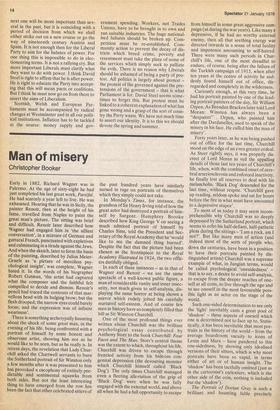Liberals after the pact
Jo Grimond
Nothing could suit television news and the sub-editors of many newspapers better than the Liberal Special Assembly. It will be visible. It has no tiresome intellectual content. It won't have any complicated results. It can.be treated in personal terms 'Steel v.
the Pact Breakers'. As publicity is important to political parties and television and the press think in headlines and horse-race terms, perhaps all parties should hold such Assemblies once a quarter.
The outcome is pretty certain. It will be left to the MPs to decide when to break the pact. David Steel will get a five-minute standing ovation. Some small voices may enquire if the journey to Blackpool was necessary, but they will be stilled by the general euphoria. Any other outcome would be disastrous. We can't have decisions such as those involved in making or breaking pacts taken by special assemblies. As Leader, I spent some time stopping the party deserting the pitch on which politics are played to slip round behind the stands and indulge in a game of its own. Politics for better or for worse are carried on around Westminster and Whitehall, partly at least by MPs elected not by parties but by con stituencies. The Liberal team may be small, its members may not be those the party would choose, but it is the team and has to decide the tactics.
I was against the pact. But since it was struck, things have undoubtedly got better as far as the country is concerned. It takes time, however, for this to sink in. The Budget may give large and welcome tax cuts. The City of London has shown how thankful it is that we did not have an election last spring. It is possible that the pact may begin to pay a few dividends. If! were an English Tory I would fight tooth and nail for devolution with the appropriate diminu tion of Scottish and Welsh influence at Westminster and, of course, for proportional representation. As for the elec torate, which is unenthusiastic about the present party system, it may, perhaps wrongly but understandably, come to think that 'hung' parliaments are less disastrous than clear majorities. So some people may by mid-summer be looking on Liberals with a less jaundiced eye. They may give David Steel the credit for grasping a few facts and admire his courage in facing some conclusions. Though most of the publicity he has achieved is, as usual, of the gossip variety, he has attracted more attention and put the party nearer the centre of power than did his immediate predecessors.
So it would be crazy having entered into the pact, to tear it up at this moment. It would be particularly crazy to pull the house down because the Ldbour Party has done exactly what it has said it would do.
But where do Liberals go next? It is common ground that we shall almost certainly have to come out of the pact by the summer. This in spite of the fact that the partners have got on surprisingly well together. It has indeed been proved that pacts in certain circumstances and for largely negative purposes can work — that may be important. I still think that last spring we should have insisted either on getting proportional representation or gone for a general election, from which I believe it was possible — I put it no higher than that— that some realignment would have emerged. But my colleagues decided otherwise. We must therefore assess the situation as it now exists.
We are already in the run-up to a General Election, a time at which the House of Commons is notoriously not at its best. Of course no House of Commons, still less any government, is ever in a sound condition. Thank God for that. If it were, we should all be dead or under a dictatorship. But added to the onset of electioneering is a sad loss of self-confidence. The British have lost their
skill in many directions. They can no longer do things simply and economically, and the places where this is most apparent are Westminster and Whitehall. Our politicians have spawned a huge, wasteful, incompetent public sector which they have no notion how to handle. Their only remedy is more of the same poison — more bureaucrats, commissions, boards and advisory bodies. The only cure governments can offer for something which doesn't work is to duplicate it. The wail goes up from the innumerable bureaucracies, the trades unions, the professions, big business and the universities for 'more'. 'More' of everything and anything: but particularly more money. As though everything can be put right by giving everyone more cash. It is the cry of the 'Barbarian' — it makes no sense. In the middle of this sits the House of Commons passing legislation in which no one believes. In the debates on the Scottish Bill, one side argues again and again that the new legislation doesn't fit with our present notions, while the other argues that it does. Few voices suggest that our present notions may need altering anyway. And so we are going to pass major legislation which we know to be unworkable — and the opposition to it rely on a referendum to reject it. It is not a healthy condition and Liberals should not prolong this Parliament beyond the Budget. Further they should not be trapped into seeming to be responsible for this condition nor for the state of industrial relations. In spite of a few glimmers of hope, these also remain very bad. Ten per cent inflation is not heaven and the factors are all still there to push it up much further next year. Nor has the government any policy adequate to deal with unemployment.
It is not capitalism that is in crisis. It is socialism that is in collapse, The faith has v.anished. The principles are shattered. The results are plain — in British Leyland and British Steel, in growing bureaucracy and surrender usually to pressure groups, sometimes to events or the IMF. The promise for the future is of office for socialists, an ever bigger top-hamper of unproductive civil servants, unemployment and statutory inflation for us all. It won't do for Liberals merely to say they will put on the brakes. Even if you slow down the Gadarene swine, they will go over the precipice eventually.
The welfare services are also at the end of the road. It is no fuse piling on more services when you are spreading the diseases they are supposed to cure. Whole districts are a disgrace. The services cannot be financed and are breaking down.
Every general election is said to be of unique importance. I do not say that the next one will be more important than several in the past, but it is coinciding with a period of decision from which we shall either strike out on a new course or go the way of nineteenth century Austria and Spain. It is not enough then for the Liberal Party to aim for the balance of power. For one thing this is impossible to do in electioneering terms. It is not a rallying cry. But more important Liberals must clarify what they want to do with power. I think David Steel is right to affirm that he is after power. He is right to educate the Party into accepting that this will mean pacts or coalitions. But I think he must now go on from there to assert the aims of Liberalism.
Scottish, Welsh and European Parliaments must be accompanied by radical changes at Westminster and in all our political institutions. Inflation has to be tackled at the source: money supply and gov ernment spending. Workers, not Trades Unions, have to be brought in to own and run suitable industries. The huge nationalised failures should be broken up. Competition must be re-established. Community action to prevent the decay of districts which breed crime, poverty and resentment must take the place of some of the services which simply seek to palliate the evils. There is no reason why Liberals should be ashamed of being a party of protest. All politics is largely about protest — the protest of the governed against the pre-. tensions of the government — that is what Parliament is for. David Steel seems sometimes to forget this. But protest must be linked to a coherent explanation of what has gone wrong and a grasp of the sort of country the Party wants. We have not much time to assert our identity. It is to this we should devote the spring and summer.



































 Previous page
Previous page